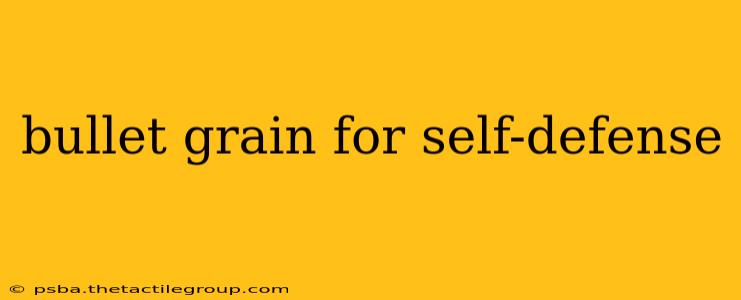Choosing the right ammunition for self-defense is a crucial decision, and understanding bullet grain weight is a key part of that process. This isn't just about picking the heaviest bullet; it's about finding the optimal balance between penetration, expansion, and overall effectiveness in a self-defense scenario. This article will delve into the intricacies of bullet grain weight and its impact on self-defense performance.
Understanding Bullet Grain
Bullet grain refers to the weight of a single bullet, measured in grains (7000 grains = 1 pound). A heavier grain bullet generally means more mass, which translates to greater momentum and potentially more penetration. Conversely, a lighter grain bullet may have a higher velocity, leading to increased expansion and energy transfer upon impact. The ideal grain weight isn't a one-size-fits-all answer; it depends on several factors.
Factors Influencing Grain Weight Choice:
-
Caliber: The diameter of the bullet significantly impacts the available grain weights. Smaller calibers like .22 LR will have lighter grains than larger calibers like .45 ACP.
-
Intended Use: The environment where you anticipate using the ammunition plays a role. For example, heavier grain bullets are generally preferred for hunting due to their superior penetration, while lighter grain bullets may offer better expansion and less over-penetration in self-defense situations within close quarters.
-
Personal Preference: Ultimately, the most effective bullet grain is one you can accurately and comfortably shoot.
-
Ammunition Type: Different ammunition types – full metal jacket (FMJ), jacketed hollow point (JHP), and others – exhibit different behaviors regarding expansion and penetration based on the grain weight.
Bullet Grain and Penetration vs. Expansion
The ideal self-defense round requires a balance between penetration and expansion. Too much penetration risks over-penetration, potentially endangering bystanders. Insufficient penetration means the bullet may not reach vital organs. Expansion, on the other hand, increases the bullet's diameter upon impact, resulting in a larger wound cavity and increased stopping power.
Heavier Grain Bullets: Tend to have higher penetration but may expand less reliably, especially in certain materials. This can lead to a straight-through wound channel with less overall energy transfer to the target.
Lighter Grain Bullets: Typically have higher velocity and better expansion, resulting in more significant energy transfer to the target. However, they may lack sufficient penetration to reliably incapacitate a threat, especially through barriers.
Popular Grain Weights for Self-Defense:
The optimal grain weight varies widely depending on the caliber. There is no universally accepted "best" grain weight, but here's a brief overview for some common calibers:
-
9mm: Popular grain weights range from 115 to 147 grains, with 124-grain JHPs being a frequent choice.
-
.40 S&W: Grain weights commonly used for self-defense range from 155 to 180 grains.
-
.45 ACP: Popular grain weights are typically between 185 and 230 grains, with 230-grain JHPs being a common choice.
Note: This is not an exhaustive list, and many other suitable grain weights are available within these calibers.
Choosing the Right Ammunition: More Than Just Grain
While grain weight is an important consideration, it’s only one piece of the puzzle. Other crucial factors include:
-
Bullet Design: Hollow points, specifically designed for expansion, are generally preferred for self-defense.
-
Velocity: Higher velocity generally means greater energy transfer but also can affect accuracy.
-
Accuracy and Reliability: The most effective ammunition is the one you can consistently hit your target with.
-
Testing and Research: Before choosing ammunition, consider researching different brands and types and testing them at the range under various conditions.
Conclusion: Responsible Self-Defense
Selecting the right bullet grain is a critical aspect of self-defense preparedness. Understanding the trade-offs between penetration and expansion, and the various factors influencing performance, empowers you to make an informed decision. Always prioritize safety, responsible gun handling, and thorough research before choosing self-defense ammunition. Remember to consult with experienced firearms instructors and professionals for personalized guidance.

